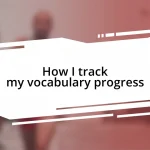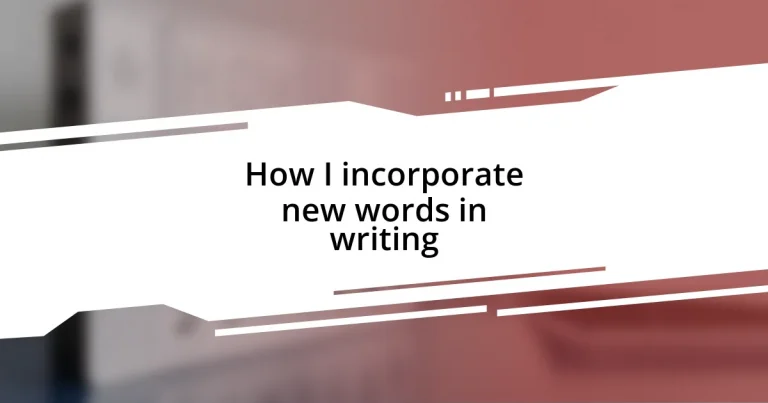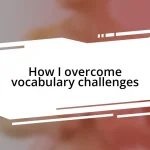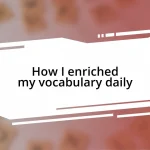Key takeaways:
- Reading widely and maintaining a vocabulary journal enhance exposure to new words and their context.
- Using tools like thesauruses and word-of-the-day apps helps in continuous vocabulary expansion.
- Incorporating new words into writing through creative practices and discussions enriches both language and expression.
- Reviewing and revising word choices deepens narrative impact and emotional connection in writing.

Understanding vocabulary expansion techniques
One effective technique I find invaluable is reading widely and diversely. I remember the thrill of discovering a new author whose style introduced me to unique expressions and phrases I’d never encountered before. Have you ever been captivated by a single sentence that changed the way you think about writing? That’s the magic of exposure—every new book opens the door to countless fresh words.
Another strategy I use is maintaining a vocabulary journal. It may sound a bit old-fashioned, but jotting down new words along with their meanings really solidifies them in my mind. Reflecting on each word’s context helps me envision its use in my own writing. Can you imagine flipping back through your notes and finding a word that resonates with your current project? It’s like rediscovering a hidden treasure.
Lastly, engaging in conversations about language with peers can spark incredible insights. I often find myself in discussions where we explore synonyms or phrases, each sharing our favorites. Hasn’t it ever struck you how often a simple chat can inspire new ways to express familiar ideas? It’s as if I’m constantly reminded that language is not just about words, but about connecting with others through those very words.
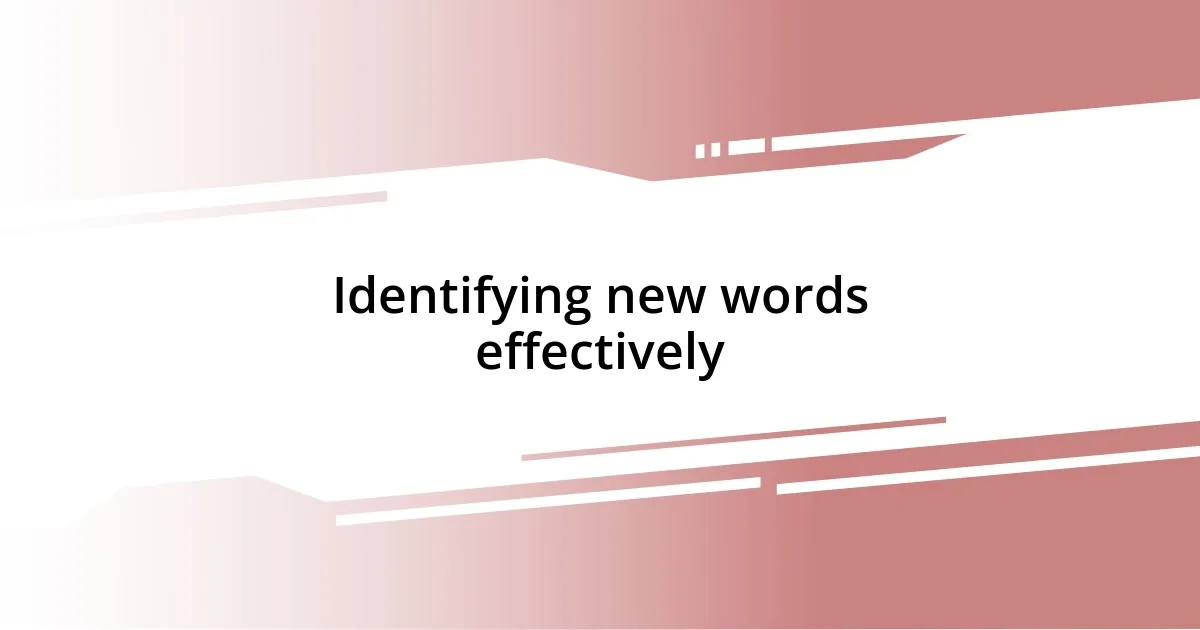
Identifying new words effectively
Identifying new words effectively starts with being mindful during your reading. Whether I’m immersing myself in fiction or non-fiction, I pay attention to words that stand out or seem out of place. There’s something exhilarating about spotting a word that feels unfamiliar yet intriguing. Remember that feeling of curiosity when you come across a word that you can’t quite define? It pushes me to dig deeper, to understand its nuances.
I also find that context is everything. When I find a new word, I often look at how it’s used in the sentence. The way a word functions within a phrase can illuminate its meaning. For instance, I stumbled upon the word “sonder” – the realization that each passerby has a life as vivid and complex as my own. It was in a beautiful piece of writing that captured this sentiment so well. Reflecting on how that word connected to my own experiences made it stick. It’s fascinating how a single word can encapsulate such a profound idea.
Lastly, using tools like thesauruses and word-of-the-day apps helps broaden my vocabulary. I’ve discovered countless pearls this way, often accompanied by personal reflections about how each word relates to my own journey. Have you tried using these resources? It’s like having a treasure chest of words at your fingertips, waiting to be explored and incorporated into your next piece of writing.
| Technique | Description |
|---|---|
| Mindful Reading | Pay attention to unfamiliar words while reading widely. |
| Contextual Understanding | Analyze how new words are used in sentences to grasp their meaning. |
| Leveraging Tools | Use thesauruses and word-of-the-day apps for continuous learning. |

Strategies for learning new words
I find that setting specific goals can significantly enhance my ability to learn new words. For example, I might decide to learn five new words each week. As I cross each one off my list, I feel a sense of accomplishment that motivates me to keep going. Have you ever felt that rush of excitement when you nail a goal? It’s thrilling!
Here’s a concise list of some strategies that have worked wonders for me:
- Set Clear Goals: Aim to learn a certain number of new words within a defined timeframe.
- Utilize Flashcards: Create flashcards with new words on one side and their meanings and example sentences on the other.
- Engage with Creative Writing: Incorporate new words into poems or stories you write, making them part of your creative expression.
In addition to setting goals, I love exploring word etymology—the history and origin of words. There’s something almost poetic about tracing a word back to its roots, understanding how meanings have evolved over time. I remember when I researched the word “melancholy,” which has origins in the Greek word for “black bile.” Discovering this depth made the term resonate with me in a whole new way. It’s not just a synonym for sadness; it carries a rich tapestry of emotion and history. Connecting with words in this manner transforms the learning process into an engaging journey rather than just a rote task.
- Explore Etymology: Discover a word’s history and origins to deepen your understanding.
- Create Associations: Link new words to personal stories or experiences to reinforce memories.
- Practice with Games: Use word games like Scrabble or crossword puzzles to make learning enjoyable.
Incorporating these strategies into my routine not only expands my vocabulary, but also enriches my writing and communication. It’s amazing how the right word can truly evoke emotion or paint a vivid picture, and I firmly believe that embracing this process keeps the love for language alive.
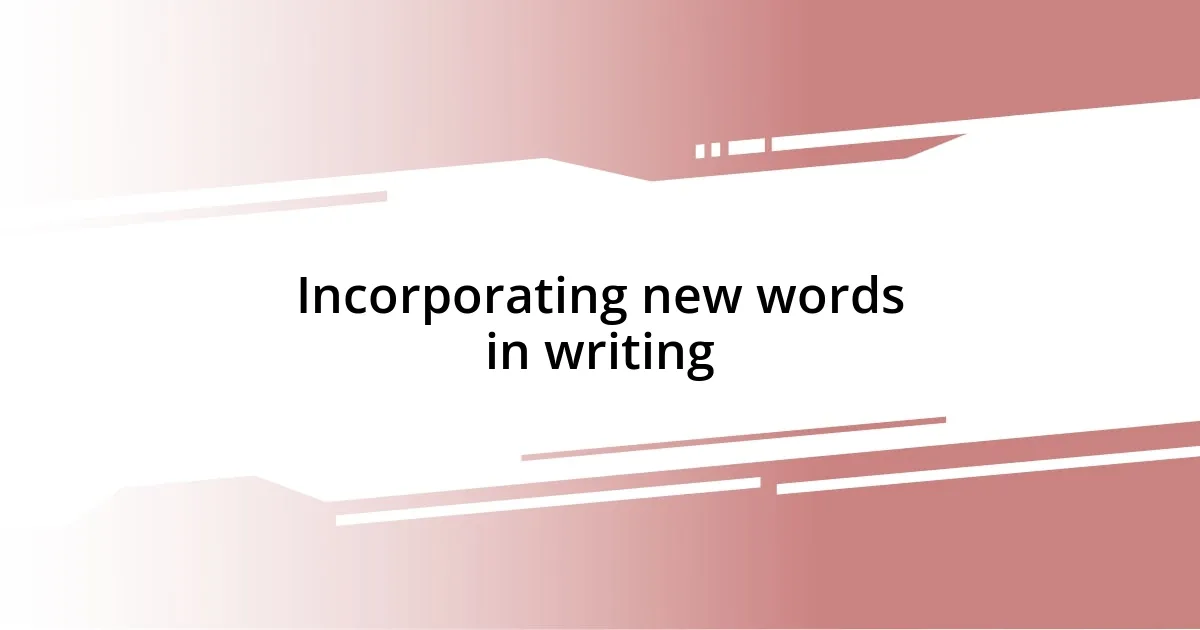
Incorporating new words in writing
Incorporating new words into my writing is like adding spices to a favorite dish; it enhances the flavor and makes everything more exciting. I often find that when I encounter a new word, I visualize how it could transform a sentence or even an entire paragraph. For instance, once I stumbled upon the word “quixotic.” It struck me as a perfect fit when describing someone with overly idealistic pursuits; I couldn’t wait to use it in my next piece. Have you ever felt that excitement when a word just clicks?
One method I love using is writing short pieces, like journal entries, where I consciously integrate a few new words I’ve learned. This practice not only cements these words in my memory but also allows me to play with them in a relaxed environment. I recall a time when I incorporated “effervescent” into a description of a bubbly character in a story. It matched the scene so well! That moment taught me how choosing the right word can elevate an entire narrative.
Moreover, I find discussing and sharing my writing with friends opens doors for feedback and new ideas. Sometimes, I’ll ask them if a particular word works for them. When one of my friends suggested the term “pensive” for a reflective moment I was portraying, it made me appreciate how collaboration can enrich my vocabulary and expression. Isn’t it fascinating how a little input from others can help refine our language and elevate our writing?
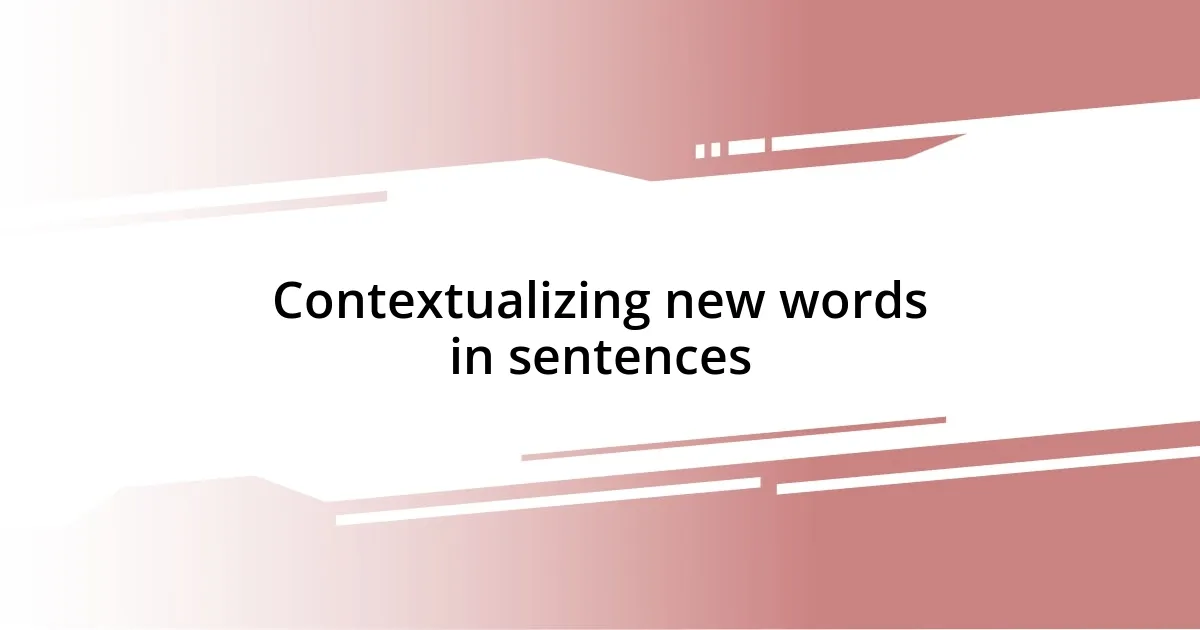
Contextualizing new words in sentences
Contextualizing new words in sentences is an art that I truly enjoy. It’s not just about placing a new term into a sentence; it’s about understanding the nuances of its meaning. For instance, when I learned the word “serendipity,” it wasn’t enough just to know it meant a happy accident. I sought to weave it into a narrative about unexpected friendships that blossomed during a trip. This layering of context makes the word come alive, don’t you think?
I’ve often found that the best way to really grasp a new word is by using it in different contexts. When I encountered “lucid,” I experimented by describing everything from a clear sky to a rational moment of clarity in a complicated situation. Each example deepened my understanding. Have you tried this? It’s incredible how seeing a word used in a variety of settings can solidify its meaning and help it stick in your memory.
Additionally, I make it a habit to jot down sentences using new words when they feel timely and relevant to my life. Just last week, I used “ephemeral” to describe a fleeting moment with a sunset that took my breath away. When I shared this sentence with a friend, they praised how it captured the transience of beauty. That feedback wasn’t just a compliment; it was a reminder of the power of contextualizing words properly. How rewarding it is to see language transform simple observations into profound expressions!

Reviewing and revising word usage
One of the most enriching steps in my writing process is reviewing and revising my word choices. When I go back through my drafts, I often encounter words that simply don’t resonate the way I initially thought they would. A while ago, I wrote a piece describing a tranquil evening by the lake, and my first instinct was to use the word “calm.” However, upon revisiting it, I realized “serene” encapsulated the moment’s beauty much more vividly. It’s amazing how a small shift can create a more immersive experience for the reader.
As I review my work, I let myself reflect upon the mood and tone I aim to convey. Sometimes I ask myself, “Does this word truly capture the essence of what I’m trying to express?” I remember a time when I was editing a piece, and “exhausted” kept popping up to describe a character. But after some thought, I decided “weary” felt more nuanced, perfectly embodying not just fatigue but also a deeper emotional strain. This type of introspection not only sharpens the language but also deepens my connection with the narrative.
Revising word usage isn’t just a technical task; it’s a chance to evoke feelings and paint clearer pictures. I often find myself emotionally invested in the word choices, as they shape the reader’s journey through my stories. For example, I had a line that initially read, “He walked through the forest.” After several revisions, it transformed into “He meandered through the whispering woods,” which added a sense of wonder and emotion. Have you ever revisited a sentence and felt it transform into something entirely new? That’s the power of careful word selection, and it’s a practice I cherish in my writing journey.










